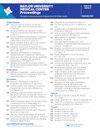提高卫生专业学生情商的教育干预。
Q3 Medicine
Baylor University Medical Center Proceedings
Pub Date : 2024-10-09
eCollection Date: 2025-01-01
DOI:10.1080/08998280.2024.2406177
引用次数: 0
摘要
情绪智力(EI)是健康专业人员的一项资产,它支持恢复力、工作满意度、跨专业协作和改善患者的健康结果。卫生专业教育的新研究表明,自我反思和同伴反馈、模拟和体验式学习可能有助于情商的发展。证据表明,培训应纵向纳入整个教育过程,其复杂性和挑战性日益增加。一些背景因素可能支持成功,例如将学习活动作为成长的机会,充分的教师和讲师培训,以及建立信任关系。本文章由计算机程序翻译,如有差异,请以英文原文为准。
Educational interventions to improve emotional intelligence of health professions students.
Emotional intelligence (EI) is an asset in health professionals supporting resilience, job satisfaction, interprofessional collaboration, and improved health outcomes for patients. Emerging research in health professions education shows that self-reflection and peer feedback, simulation, and experiential learning may contribute to the development of EI. The evidence indicates that training should be incorporated longitudinally throughout the educational process with increasing complexity and challenge. Several contextual factors may support success, such as framing the learning activities as opportunities for growth, adequate faculty and instructor training, and establishment of trusting relationships.
求助全文
通过发布文献求助,成功后即可免费获取论文全文。
去求助
来源期刊

Baylor University Medical Center Proceedings
Medicine-Medicine (all)
CiteScore
1.30
自引率
0.00%
发文量
245
 求助内容:
求助内容: 应助结果提醒方式:
应助结果提醒方式:


